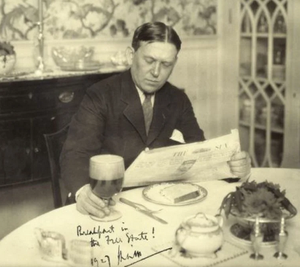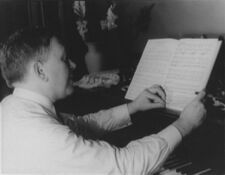H.L. Mencken
(journalist) | |
|---|---|
 | |
| Born | September 12, 1880 |
| Died | January 29, 1956 (Age 75) |
Henry Louis Mencken was an American journalist, essayist, satirist, cultural critic, and scholar of American English. Mencken opposed the American entry into both World War I and World War II.
Career
Starting in 1899, Mencken served as a reporter at the Baltimore Morning Herald for six years. Mencken then moved to The Baltimore Sun, where he worked for Charles H. Grasty. Mencken began writing the editorials and opinion pieces that made his name at The Sun. He continued to contribute to The Sun, The Evening Sun (founded 1910) and The Sunday Sun full-time until 1948, when he stopped writing after suffering a stroke.
Views
As a frank admirer of Nietzsche, Mencken was a detractor of populism and representative democracy, which he believed was a system in which inferior men dominated their superiors.[1] Like Nietzsche, he also lambasted religious belief and the very concept of God, as Mencken was an unflinching atheist, particularly Christian fundamentalism, Christian Science and creationism, and against the "Booboisie," his word for the ignorant middle classes.[2][3][4]
In the summer of 1925, he attended the famous Scopes "Monkey Trial" in Dayton, Tennessee, and wrote scathing columns for the Baltimore Sun (widely syndicated) and American Mercury mocking the anti-evolution Fundamentalists (especially William Jennings Bryan). The play Inherit the Wind is a fictionalized version of the trial, and as noted above the cynical reporter E.K. Hornbeck is based on Mencken. In 1926, he deliberately had himself arrested for selling an issue of The American Mercury, which was banned in Boston by the Comstock laws.[5] Mencken heaped scorn not only on the public officials he disliked but also on the state of American elective politics itself.
“The state maintains its control of elementary education, not primarily to reduce illiteracy and turn the eyes of the plain people toward the stars, but to make sure that they are not taught anything that is subversive. Public education is thus a police measure.”
H.L. Mencken (1924) [6]
Great Depression, war, and afterward

During the Great Depression, Mencken did not support the New Deal, which cost him popularity, as did his strong reservations regarding U.S. participation in World War II, and his overt contempt for President Franklin D. Roosevelt. He ceased writing for The Baltimore Sun for several years, focusing on his memoirs and other projects as editor while he served as an adviser for the paper that had been his home for nearly his entire career. In 1948, he briefly returned to the political scene to cover the presidential election in which President Harry S. Truman faced Republican Thomas Dewey and Henry A. Wallace of the Progressive Party. His later work consisted of humorous, anecdotal, and nostalgic essays that were first published in The New Yorker and then collected in the books Happy Days, Newspaper Days, and Heathen Days.
References
- ↑ v
- ↑ http://www.chiroweb.com/mpacms/dc/article.php?id=42430
- ↑ https://books.google.com/books?id=wd5YYZ7NBO4C&pg=PT16
- ↑ https://books.google.com/books?id=RU0DndWVSPoC&pg=PA228 |
- ↑ http://www.massmoments.org/moment.cfm?mid=104
- ↑ review of The Goslings by Upton Sinclair (Baltimore Sun, 23rd February, 1924)